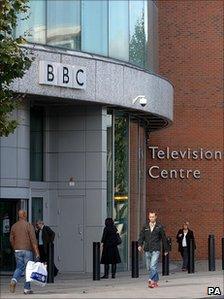BBC journalists in one-day strike
- Published

The BBC has apologised to viewers and listeners for any disruption
Journalists at the BBC are taking part in a 24-hour strike in a row over compulsory redundancies.
Members of the National Union of Journalists (NUJ) voted in favour of industrial action last month because a number of World Service journalists are facing compulsory redundancy.
The NUJ has warned that the strike will cause "widespread disruption" to radio and TV programmes.
A BBC spokesman said the corporation was "disappointed" by the action.
Viewers and listeners saw some changes to BBC output on Friday morning as a result of the strike.
Radio 4's Today programme began at 0700 BST - an hour later than normal.
On 5 Live, meanwhile, regular Breakfast hosts Nicky Campbell and Rachel Burden were replaced by Ian Payne and Julia Bradbury.
Job losses
A number of people working in the World Service and BBC Monitoring are facing compulsory redundancy this summer, the NUJ said.
General secretary Michelle Stanistreet said it was "shameful" that the BBC was "provoking" a strike over a handful of job losses.
Ms Stanistreet added that the union have offered a number of solutions to the dispute, and that an offer from the conciliation service Acas for peace talks had not been taken up by management.
"There are so many people who want to leave the BBC that this could be resolved through negotiations," she said.
"Jobs are being saved and created at management level, but journalists are losing theirs."
The BBC said it would continue with its efforts to reduce the need for compulsory redundancies.
"Industrial action will not alter the fact that the BBC is faced with a number of potential compulsory redundancies, following significant cuts to the central Government grants that support the World Service and BBC Monitoring," the spokesman said.
Another 24-hour strike is planned for 29 July.
- Published8 July 2011
- Published6 July 2011